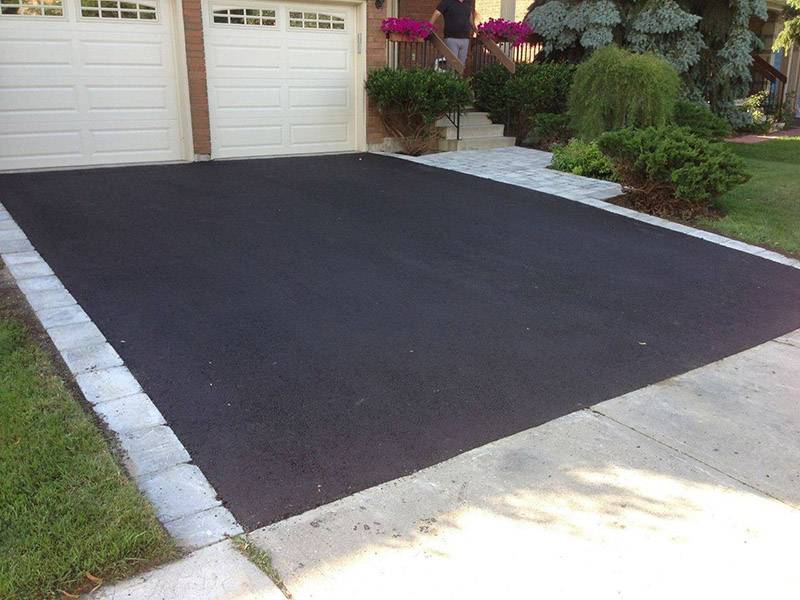
How to Properly Repair Your Asphalt Driveway
An asphalt driveway is a popular choice for homeowners due to its durability and cost-effectiveness. However, over time, it can develop cracks and potholes that need to be repaired to maintain its functionality and appearance. In this article, we will discuss the common problems with asphalt driveways, the materials needed for repairs, and various repair methods to make your driveway look as good as new. Go check out our concrete services
What are the common problems with asphalt driveways?
Asphalt driveways are exposed to various elements and conditions, leading to common problems such as cracks and potholes. Cracks in the asphalt are usually caused by temperature changes, heavy traffic, or improper installation. There are different types of cracks that can occur, including longitudinal cracks, transverse cracks, and block cracks.
What are the different types of cracks?
Longitudinal cracks are vertical cracks that run parallel to the pavement’s centerline, often caused by the natural movement and settling of the underlying soil. Transverse cracks, on the other hand, are horizontal cracks that extend across the pavement, usually caused by temperature fluctuations. Block cracks appear as interconnected rectangles or squares, indicating shrinkage of the asphalt surface.
What are the signs of alligator cracking?
Alligator cracking is a severe form of cracking that resembles the skin of an alligator. It is usually caused by the failure of the underlying pavement structure. Signs of alligator cracking include multiple interconnected cracks forming a pattern resembling the scales of an alligator. If you notice these signs, it’s best to consult a professional contractor for a thorough assessment of your driveway.
How do temperature changes affect asphalt?
Temperature changes can have a significant impact on asphalt driveways. When exposed to extreme heat, asphalt expands, leading to expansion cracks. Conversely, during colder temperatures, asphalt contracts, causing contraction cracks. These cracks can worsen over time if not repaired promptly. It’s important to monitor temperature changes and address any resulting cracks to prevent further damage.
What materials are needed for asphalt repair?
Before repairing your asphalt driveway, it’s essential to gather the necessary materials. The type of asphalt used for repairs depends on the severity of the damage and the climate in your area. In some cases, minor cracks can be efficiently repaired using a crack filler, while larger cracks and potholes may require hot mix asphalt or cold patch asphalt. Additionally, you will need specific tools to apply the repair materials and ensure a seamless finish.
What type of asphalt is best for repairs?
When it comes to choosing the right asphalt for repairs, it’s crucial to consider the extent of the damage and the weather conditions in your region. For minor cracks, a standard crack filler can be used. However, for larger cracks and potholes, hot mix asphalt or cold patch asphalt is recommended. Hot mix asphalt requires heating before application and provides a long-lasting repair, while cold patch asphalt can be used right out of the bag and is suitable for temporary fixes.
What tools are needed for DIY asphalt repair?
If you prefer the do-it-yourself approach to repair your asphalt driveway, you will need several tools to ensure a successful and professional-looking result. Some essential tools for DIY asphalt repair include a push broom, a leaf blower or broom, a tamper or compactor, a rubberized asphalt crack filler, a large bucket, a trowel or putty knife, and safety gear such as gloves and goggles.
Should I hire a professional contractor for asphalt repairs?
While minor cracks can be repaired using DIY methods, larger cracks and extensive damage are best handled by professional contractors. Professional contractors have the expertise, equipment, and knowledge to carry out repairs more efficiently and effectively. They can provide long-term solutions and ensure the durability of the repairs, saving you time and money in the long run. If you’re unsure about your ability to repair the asphalt driveway properly, it’s highly recommended to consult a professional contractor.
How to repair minor cracks in your asphalt driveway
If you notice minor cracks in your asphalt driveway, you can tackle the repairs yourself with the right tools and materials. Here’s a step-by-step guide on how to repair minor cracks:
How do I clean the cracks before repairing?
Before applying the crack filler, it’s important to clean the cracks thoroughly to ensure proper adhesion. Using a push broom or a leaf blower, remove any dirt, debris, or vegetation from the cracks. For deeper cleaning, pressure washing or using a wire brush can provide a more thorough result.
What type of crack filler should I use?
There are various types of crack fillers available in the market, including liquid crack fillers, asphalt-based fillers, and rubberized asphalt crack fillers. Consider the size of the cracks and choose a filler that suits your specific repair needs. Rubberized asphalt crack fillers are highly recommended for their flexibility and durability.
How do I apply the crack filler?
Using a trowel or putty knife, carefully apply the crack filler into the cracks, ensuring a smooth and even application. Fill the cracks slightly above the surface, as the material will settle over time. As the filler dries, it will adhere to the surrounding asphalt, creating a tight seal. Allow the crack filler to cure for at least 24 hours before using the repaired area.

How to fix potholes in your asphalt driveway
Potholes can be a major nuisance and pose safety hazards in your asphalt driveway. Repairing potholes promptly will prevent further damage to your pavement and extend its lifespan. Here’s a step-by-step guide on how to fix potholes:
What is the best way to remove debris from a pothole?
Before filling the pothole, it’s crucial to remove any loose debris or vegetation from the area. Using a broom or a brush, thoroughly clean the pothole, ensuring it is free from any loose material. This step is essential to achieve a proper bond between the asphalt and the repair material.
What type of asphalt should I use to fill the pothole?
For filling potholes, hot mix asphalt or cold patch asphalt can be used. Hot mix asphalt is typically preferred for permanent repairs, as it provides a more durable and long-lasting solution. However, cold patch asphalt can be a suitable temporary fix for smaller potholes or as a temporary solution until hot mix asphalt can be applied.
How do I properly compact the asphalt in the pothole?
After pouring the asphalt into the pothole, it’s crucial to properly compact it to ensure a smooth and even surface. Use a tamper or compactor to compact the asphalt, ensuring it is level with the surrounding pavement. Compact the material in layers, adding more asphalt as needed until the pothole is completely filled.
When should I consider replacing my asphalt driveway?
While regular maintenance and repairs can extend the lifespan of your asphalt driveway, there comes a time when replacement is necessary. Here are some signs that indicate it’s time to consider replacing your asphalt driveway:
What are the signs that my driveway needs replacement?
If your driveway is showing significant signs of wear and tear, such as extensive cracking, potholes, or large sections of asphalt crumbling, it may be time to consider replacing it. Additionally, if your driveway is more than 20-30 years old and requires frequent repairs, replacement might provide a more cost-effective and long-term solution.
Is it cost-effective to replace my asphalt driveway?
Replacing an asphalt driveway can be a significant investment; however, it can also be a cost-effective decision in the long run. Continuously repairing an old and deteriorated driveway can add up, especially if the repairs only provide temporary solutions. By replacing the driveway, you will have a new, durable surface that requires minimal maintenance for years to come.
How long does it take to replace an asphalt driveway?
The time it takes to replace an asphalt driveway varies depending on the size of the project and the specific requirements. On average, the process can take a few days to a week, including the removal of the old asphalt, foundation preparation, laying the new asphalt, and allowing it to cure properly. It’s recommended to consult a professional contractor for a more accurate timeline based on your specific project.
In conclusion, maintaining and repairing your asphalt driveway is essential to ensure its longevity and functionality. By understanding the common problems, gathering the right materials, and using proper repair methods, you can keep your driveway looking its best. DIY repairs are suitable for minor cracks, but for more extensive damage and better long-term results, it’s best to hire a professional asphalt contractor. Regular maintenance, such as sealcoating and proper cleaning, can also help prevent the need for repairs and extend the lifespan of your asphalt driveway.

Oregon
Portland, Beaverton, Gresham, Hillsboro, Corbett, Cornelius, Fairview, Forest Grove, Gladstone, Happy Valley, King City, Lake Oswego, Milwaukie, Oregon City, Sherwood, Tigard, Troutdale, Tualatin, West Linn, Wilsonville, Wood Village, Aloha, Beavercreek, Boring, Cedar Mill, Clackamas, Damascus, Dunthorpe, Garden

Washington
Vancouver, Battle Ground, Camas, Washougal, Ridgefield, La Center, Yacolt, Hazel Dell, Minnehaha, Salmon Creek, Walnut Grove, Orchards.